
The main research directions prominent in Group for Nutrition and Metabolism are: 1) research in the field of public health and nutrition, and 2) studies on the effects of nutritive and non-nutritive bio-active components in food by application of various experimental model systems, ranging from cell culture, via animal models, to interventional clinical studies. The multidisciplinary character of the research team which currently consists of 20 researchers (of various backgrounds, including medical doctors, pharmacists, molecular biologists, biologists, technologists, mathematicians) and a broad range of expertise (internal medicine, clinical pharmacy, medical biochemistry, food chemistry, nutrition, public health, health protection, food safety, food technology, and state of the art cell cultivation and molecular biological techniques) represent the basis for the coverage of the broad field of nutrition science.
Research activities conducted by Group for Nutrition and Metabolism include assessment of complex interactions of nutrient intake-status-health effects, as well as the evaluation of the role of nutritive therapy in the prevention and treatment of non-communicable diseases.
In the food and metabolism research domain, in addition to interventional nutritive clinical trials, the mechanism of action of various active food components has been studied in animal models, with the purpose of determining the mechanism of development and prevention of diverse diseases.
In the field of public health nutrition, the Group works intensively on capacity building, development and management of a food composition database for Serbia and the Balkan region, harmonization of nutritional recommendations on micronutrient intake and creation of software applications with an objective of validating the scientific methods intended for application in dietary assessment. The focus is particularly on the development and improvement of the methodology used for evaluation of food consumption and diet quality on both the individual and population level. Through participation in a number of FP6 and FP7 projects, the Group has created (in collaboration with computer programmers) the first electronic Serbian Food Composition Database, which is harmonized with the databases of other European countries.
The Group organizes epidemiological studies using state-of-the-art methodological approaches to explore the nutritive status and metabolic functions of diverse population groups in Serbia. The Group members evaluate the dietary intake, metabolic status and the role of various micronutrients, with emphasis on folates and vitamin D.
Further activities of the Group team include education on the importance of physical activity essential for maintaining an ideal body weight, prevention and treatment of obesity as well as enhancing the overall quality of life. Moreover, the Group researchers are involved in the creation of physical activity programs tailored for different population groups with an objective to reduce the main risk factors for the development of chronic non-communicable diseases by improving the aerobic capacity, metabolic and immune functions, increasing fibrinolytic activity, decreasing platelet adherence and increasing energy expenditure.

Comments are closed.